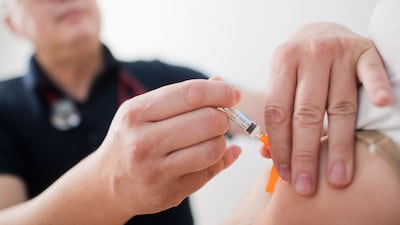Parents in the UK have been told to ensure their children are fully vaccinated against polio after the virus that causes the disease was found in London sewage samples, 40 years after the last outbreak.
Epidemiological advances since then mean that scientists are now using “world-beating” tools to work out how to “go along the pipe” and locate where the virus came from, a UK health minister said on Wednesday.
“In theory, it might be possible to find individual households or streets,” said Lord Kamall.
The UK Health Security Agency offered further reassurance, suggesting the risk to the public overall was “extremely low”, with the virus detected only in sewage samples in recent months and no cases of paralysis reported.
The UKHSA said the traces found were likely “vaccine-derived”, meaning they came from someone who received the live polio vaccine abroad.
That person would then have passed the virus to closely linked people in London, who shed the virus in their faeces.
“The vaccine virus does have the potential to cause paralysis if it has mutated, and there is evidence that this vaccine virus is beginning to mutate,” Dr Mary Ramsay, head of immunisation at UKHSA, said.
“But the single biggest message for individuals is that they can prevent any risk from that virus by being fully vaccinated. So the message is to make sure that you and your family are all up to date for your routine vaccinations.”
The UKHSA is now investigating the extent of community transmission having established a “national incident” as a precaution on Wednesday to check for cases elsewhere.
Britain stopped using the live oral polio vaccine in 2004 and the UN's health agency has called for it to be phased out worldwide and replaced with the inactivated polio vaccine.
The oral polio vaccine replicates in the gut and can be passed to others through faecal-contaminated water — meaning it will not hurt the child who has been vaccinated but it could infect their neighbours in places where hygiene and immunisation levels are low.
While weaker than wild poliovirus, this variant can cause serious illness and paralysis in people not vaccinated against the disease.
Polio, which was officially eradicated in the UK in 2003, can cause paralysis in rare cases and can be life-threatening.
The last case of natural polio infection acquired in the UK was in 1984, nearly 40 years ago.
The inactivated polio vaccine is now given to young babies in the UK as part of a combination vaccine, with boosters given when children are three and 14.









